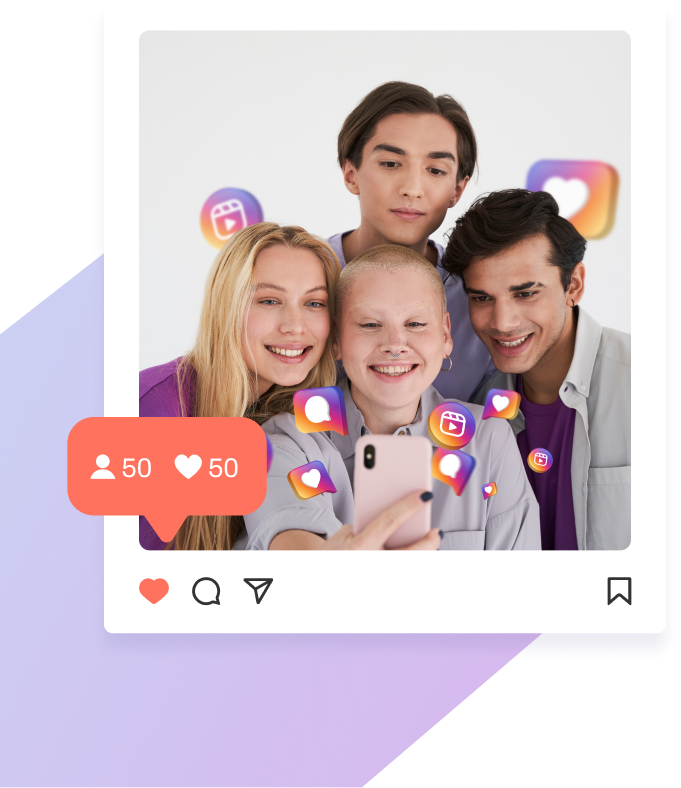Social Media Marketing for Small Business
In the past, small businesses employed traditional marketing, such as print media and word-of-mouth, to gain visibility. Small businesses now have a powerful tool that is better than traditional channels. It’s called social media marketing for small businesses.
It empowers entrepreneurs to share their offerings with their audience. They can directly engage with them and compete with their competitors in the industry through social connectivity. If you want your small business to thrive in the competitive market, you shouldn’t neglect setting up a social media presence.
Platforms like Facebook, Instagram, Twitter, and LinkedIn are already dominating our online interactions. So, the question isn’t whether small businesses should utilize social media. In fact, it’s about how to use it to its maximum potential.
In this guide, we’ll dive into the social media marketing world and explore its potential for small businesses. So let’s get started.

All About Social Media Marketing for Small Businesses
At its core, social media marketing for small businesses is more than just posting content or running ads. The goal is to tell a story, have meaningful conversations, and build a brand community. Social media marketing provides a way to turn casual viewers into potential customers and loyal customers.
Importance of Social Media Marketing
The importance of social media marketing goes beyond just being present on social media. You can use these social platforms to create a story that resonates with your audience, making a strong impression. You can also use it to show your brand personality and connect with people with your engaging social media content.
Small businesses can use social media platforms to show what makes them special, tell their story, and connect with people. It allows brands to show their personality, share what they believe in, and build relationships that go beyond buying and selling.
How Effective Is Social Media Marketing for Small Businesses?
Are you wondering how effective social media marketing is for small businesses? The benefits of a well-crafted social media strategy are multifaceted for a small business. It’s a tool for brand visibility, customer engagement, and market research. By effectively utilizing the power of social media, small enterprises can:
- Reach a Wider Audience: Social media enables businesses to connect with potential customers globally, breaking geographical barriers.
- Engage with Customers: Direct engagement through social media helps customers understand their needs, preferences, and feedback in real-time.
- Build Brand Loyalty: Posting consistent and valuable content on your social media builds trust and loyalty, fostering long-term relationships with customers.

Crafting an Effective Social Media Strategy
You can’t craft a social media strategy in isolation. A lot goes into crafting a strategy that leaves an impact on your prospects and convinces them to convert. Let’s walk you through some basic steps of creating a social media strategy.
Identifying the Target Audience and Demographics
Understanding your audience is fundamental in devising a successful social media strategy. For small businesses, pinpointing their potential customers’ demographics, interests, behaviors, and pain points is very important. Creating buyer personas helps visualize your ideal customer. It then allows you to tailor content and strategies in a way that resonates with them.
Demographic analysis looks at age groups, where people live, gender, interests, and online behavior. This information helps you find out which social media sites your audience uses the most. In turn, it helps you share content with them more effectively.
Choosing Suitable Social Media Platforms
Every social media platform has distinct characteristics tailored to diverse user demographics and content formats. Not all platforms align with every business, as each caters to a unique audience base. Instagram is great for telling stories with pictures. Twitter is good for short messages. LinkedIn is for professional networking. Facebook is for building communities.
For small businesses, it’s essential to choose platforms that align with their brand, audience, and content style. Focusing on the right platforms ensures efficient resource allocation and maximizes engagement potential.
Creating a Hyperlocal Social Media Marketing Strategy
One powerful strategy for small businesses is a hyperlocal social media marketing strategy. This method focuses on a certain area or community so that businesses can connect with local customers more. Leveraging location-based hashtags, geotags, and local events can significantly boost visibility among nearby audiences.
Hyperlocal social media marketing strategies foster a sense of community, showcasing the business as a part of the local fabric. To build trust in the community, you can participate in local events and collaborate with other local businesses. Sharing local stories also helps.

Leveraging Social Media Marketing Tools and Resources
Small businesses starting on social media must use the right tools to be efficient and effective. There are social media marketing tools for small businesses. These tools help with creating content, scheduling posts, analyzing data, and managing communities.
Some ways you can leverage social media marketing tools and resources for your small business
- Content Creation Tools: You can use Canva and Adobe Spark to create stunning visuals, even if you aren’t a design expert. These tools provide templates, stock images, and editing features to create engaging graphics, infographics, and videos.
- Scheduling and Management Solutions: Platforms like Hootsuite, Buffer, and Later enable businesses to pre-schedule posts across various social channels. This simplifies the posting routine, maintains consistency, and liberates time for immediate engagement.
- Analytical and Insightful Tools: Services like Google Analytics, Facebook Insights, and Twitter Analytics furnish crucial data on audience demographics, engagement metrics, and content effectiveness. These insights facilitate strategy refinement and deepen understanding of audience behaviors.

Maximizing Native Tools on Social Media Platforms
In addition to third-party tools, each social media platform offers native tools designed to enhance visibility and engagement.
- Facebook Business Suite: For Facebook and Instagram, the Business Suite offers tools for managing profiles, creating ads, and viewing insights. It’s a centralized hub for businesses to streamline their activities on these platforms.
- Twitter Analytics: Twitter’s native analytics provides information on tweet performance, audience engagement, and demographics. It aids in understanding what content resonates most with followers.
- LinkedIn Page Analytics: LinkedIn’s analytics provides insights into audience demographics, engagement levels, and page views. It helps in tailoring content and engagement strategies for a more professional audience.
- Instagram Insights: Instagram Insights is a tool that provides data on how your content performs and how your audience interacts with it. It also gives information about your audience’s demographics. Moreover, it helps understand which posts resonate most with followers and assists in refining content strategies.
By using these built-in tools, you can gather important data and improve your content strategies for each platform.

How To Promote Your Business on Instagram and Other Platforms
Each platform demands a unique approach, catering to the specific preferences and behaviors of its user base. Small businesses can strategically tailor their content and engagement strategies to the platform’s strengths, maximizing their presence.
Instagram for Small Business
Instagram stands out as a powerhouse platform for small businesses due to its visual-centric nature and active user base. Crafting a robust strategy specifically tailored for Instagram can yield significant results. Let’s learn how to promote your business on Instagram.
- Utilize a Business Profile: Switching to an Instagram Business Profile unlocks valuable features. Some include contact buttons, access to analytics, and the ability to run ads—all crucial for small businesses looking to optimize their presence. Following influencer marketing trends can also help you get engagement on your business profile.
- Compelling Visuals and Stories: Instagram thrives on captivating visuals. High-quality images, videos, carousel posts, and Instagram Stories provide a dynamic way to engage with the audience. Leveraging Stories’ ephemeral nature allows for real-time updates, behind-the-scenes content, and interactive polls or quizzes, fostering stronger connections.
- Engagement and Community Building: Active engagement is key. Respond to comments, engage with followers through comments and direct messages, and actively participate in relevant conversations to build brand loyalty.
Leveraging Other Social Media Platforms
Apart from Instagram, diversifying the presence across various platforms widens the business’s reach:
- Facebook: With its vast user base, Facebook remains an essential platform for small businesses. Leveraging Facebook Groups, creating events, and utilizing its advertising options can significantly boost visibility.
- LinkedIn: LinkedIn is great for B2B businesses. It helps you connect with others, share industry content, and build professional credibility.
- X (formerly Twitter): Its fast-paced environment allows businesses to engage in real-time conversations, share updates, and leverage trending topics to increase visibility.
- Pinterest: Ideal for businesses with visually appealing products or services, Pinterest allows for long-term visibility of content, driving traffic to websites.

Leveraging Social Media Marketing Companies for Small Business
Small businesses often face resource constraints, making managing a comprehensive in-house social media strategy challenging. This is where social media marketing companies for small businesses can be invaluable allies.
Benefits of Collaborating With Social Media Marketing Companies
If you’re unsure about hiring social media marketing companies for your small business, let’s walk you through some benefits.
- Expertise and Strategy: These specialized firms have a dedicated team with in-depth knowledge of social media trends, algorithms, and effective strategies for small businesses. They can craft tailored plans aligned with business objectives, ensuring optimal results.
- Time and Resource Efficiency: Outsourcing social media marketing to a specialized agency frees up time and resources for small business owners. It allows them to focus on core business activities while the experts manage the complexities of social media campaigns.
- Access to Tools and Technologies: Social media marketing firms have access to advanced analytics tools, management platforms, and software. These tools allow them to track performance metrics, optimize campaigns, and generate detailed reports.
- Cost Effectiveness: Contrary to common belief, outsourcing social media marketing can be cost-effective for small businesses. Collaborating with an agency is often more affordable than hiring an in-house team. You will have to spend on salaries, benefits, and training expenses if you hire a team.
Choosing the Right Social Media Marketing Company
Now that you’ve decided to outsource the services of a social media marketing company, how should you choose the right one? We’ve listed three basic criteria to help you make an informed decision.
- Experience and Track Record: Look for agencies specializing in small business marketing with a proven track record of successful campaigns within your industry.
- Clear Communication and Transparency: Transparency in their methodologies, clear communication channels, and a detailed understanding of your business goals are crucial factors to consider.
- Customized Strategies: Seek companies that offer personalized strategies catering to small businesses’ unique needs and budget constraints.

4 Key Social Media Marketing Services for Small Businesses
Selecting social media marketing services for small businesses demands thorough research. Let’s explore key social media marketing services for small businesses:
- Targeted Campaigns: Crafting targeted ad campaigns optimized for specific demographics, locations, or interests is pivotal for small businesses with limited budgets. These services help maximize the impact of ad spend, ensuring it reaches the most relevant audience.
- Content Creation and Curation: Small businesses often struggle with content creation. Services offering content creation, including graphics, videos, and engaging copywriting, alleviate this burden. They consistently deliver high-quality content aligned with the brand’s voice and objectives.
- Community Management: Engaging and nurturing an online community is crucial. Services focusing on community management promptly respond to comments, messages, and inquiries, fostering relationships and enhancing brand loyalty.
- Performance Tracking and Reporting: Understanding the impact of social media efforts is vital. Services that offer comprehensive analytics and reporting help small businesses track key performance metrics, providing insights to refine strategies for better results.

Social Media Advertising and Budget Allocation
Paid social media advertising is crucial for small businesses to expand their audience. It is a key part of an effective social media strategy. Platforms such as Facebook Ads, Instagram Ads, LinkedIn Ads, and Twitter Ads present various targeting capabilities. They empower businesses to engage specific demographics, interests, and behaviors.
For small enterprises, paid advertising furnishes a budget-friendly avenue to magnify their content, heighten brand exposure, and spur conversions. It facilitates precise targeting, guaranteeing that messages reach the intended audience.
Budget Allocation and Optimization
Determining the advertising budget requires a balanced approach. Small businesses often operate with limited resources, making it crucial to allocate budgets wisely. A starting point involves setting clear objectives – to increase website traffic, boost sales, or grow the audience base.
Testing various ad formats, targeting options, and ad creatives with smaller budgets initially helps understand what works best before scaling up. Additionally, regularly monitoring ad performance metrics aids in optimizing campaigns and ensures that the budget is efficiently utilized.
Emphasizing Content Quality in Ads
While advertising on social media is essential, the quality of the content within the ads remains paramount. Compelling visuals, concise yet impactful copy, and a clear call-to-action (CTA) are vital to successful ad creatives. Tailoring ads to resonate with the target audience’s needs and preferences boosts engagement and conversions.
Moreover, A/B testing different ad variations allows businesses to refine their strategies, identifying the most effective elements for driving desired outcomes.
Harnessing Organic Reach
While paid advertising is potent, organic reach shouldn’t be neglected. When you create content that people want to share, it helps you reach more people without spending money. To increase organic reach, you can encourage users to interact and use relevant hashtags. The power of user-generated content contributes to organic reach.

Implementing a Consistent Content Schedule
A consistent content strategy forms the backbone of successful social media marketing for small businesses. Let’s explore some key components in establishing a robust online presence:
- Content Calendar Creation: Create a content calendar for organized and strategic content creation. This helps maintain a consistent flow of posts that align with business goals and audience interests.
- Frequency and Timing: Determining the optimal posting frequency and timings is crucial. Analyzing audience behavior and platform insights can guide scheduling content when the audience is most active.
- Batch Content Creation: Creating content in batches saves time and ensures a steady flow, avoiding last-minute rushes.
- Engagement and Response Time: Promptly responding to audience comments, inquiries, and messages fosters engagement and strengthens relationships.
Wrapping Up
Besides being a communication platform, social media has become a doorway to establishing brand identity, engaging with audiences, and achieving tangible outcomes. It is especially valuable to small businesses as it provides them a space to showcase their uniqueness. They can also use it to connect closely with audiences and foster genuine relationships. It breaks geographical barriers, offering limitless opportunities to reach potential customers. All while effectively conveying brand values.
At Path Social, we specialize in navigating the intricacies of social media marketing for small businesses. Our team has been working for more than ten years and has built a team of Instagram influencers. We also have our special AI targeting system. This unique approach ensures the engagement of organic, interested users, delivering unparalleled results that set your brand apart.
Take the first step toward your Instagram success journey with Path Social. Build a thriving community that resonates and expands—initiate your brand’s triumph in the digital world.
Start growing and gaining Instagram followers today with Path Social!


Want Free Instagram
Followers?
Let our AI targeted organic growth work for you for free
Get Free Instagram Followers







